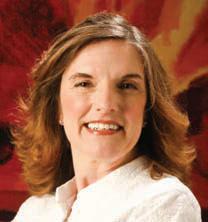How do we create a post-fossil fuel society?
May 23, 2015

Fielding Graduate University President Katrina Rogers
Opinion by Fielding Graduate University President Katrina Rogers, PhD
The oil spill the occurred off 20 miles north of Santa Barbara on May 19 raises once again the specter of an increasingly polluted world. With all of us so dependent on fossil fuels, there is no-one to blame. Our economy is predicated on infinite growth: growth requires energy. Indeed, the history of modern society is the history of oil.
The more we take from the planet, the more consequences there are. Sadly, these consequences are felt not just by human beings, but are borne by other species as well.
While we in Santa Barbara may bemoan our beautiful coastline sullied by oil once more, we need to remember that the Environmental Protection Agency records such spills every day all year long—from pipelines, trains, oil derricks, off-shore platforms, and other industrial activities. It may be easy to shake our heads at the “oil companies” yet that is too simple. The real issue is that we are having a failure of imagination to create the conditions for a post-fossil fuel society.
How can we intentionally restore our own imagination? One might look to the early days of American history, where a group of people decided to write down the essential principles for a new democracy.
Over the centuries, the definition of democracy has changed and for the most part, expanded. The women’s movement, civil rights movement, and the most recent extension of liberties to our LGBTQ brethren are good examples of this expansion. Our country’s founders were broadly educated. Many of them were educated in the sciences, history, economics, engineering, and philosophy. They were adept at politics and knew how to use the written word to persuade others. As such, they had the ability to make connections across knowledge domains to solve the big, vexing questions of their day. They became good leaders.
In today’s world, we are educated in specialties. In fact, we sometimes brag about how specialized our knowledge has become. While this is a model that has served us well to get us where we are today, it will not serve us well in the future.
The oil spill is a good example of where knowledge intersects: the ocean environment, the new technologies for mitigation, the way we communicate, the political and social frames we use. All of these elements swirl around events such as these –and the leaders of the future will need to be prepared to be complex thinkers, quick analysts of information, adroit at communication, and able to move swiftly in the face of uncertainty.
In thinking about what we leave our descendants, the single most important thing we can do is build an educational system that provides them a multi-disciplinary approach to the world. Only then will they have the flexible minds that can make connections across different areas of knowledge, and to give them the abilities and skills to do so. Only then can we address the fundamental weakness of our global economic system, which is ultimately unsustainable. Infinite growth in an finite world is an impossibility.






The comments below represent the opinion of the writer and do not represent the views or policies of CalCoastNews.com. Please address the Policies, events and arguments, not the person. Constructive debate is good; mockery, taunting, and name calling is not. Comment Guidelines